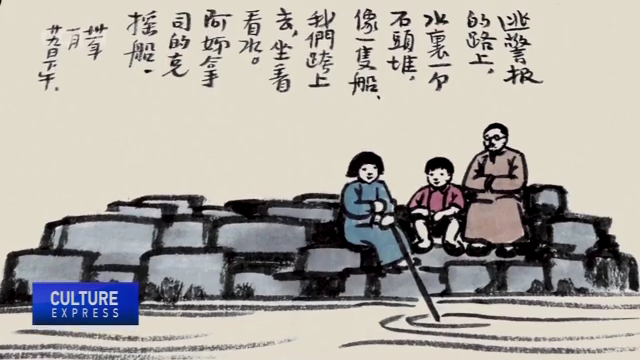
19:17, 18-Dec-2018
Feng Zikai: Insight into a painter's life
Updated
18:04, 21-Dec-2018
03:54

This year marks the 120th anniversary of the birth of Feng Zikai. Feng was a prestigious painter, writer and translator of 20th century China. Now let's get a look inside the master's artistic life.
In this exhibition hall at the National Art Museum of China, paintings of Feng Zikai have stunned viewers' eyes. Feng's work was largely drawn from his daily experiences and provided insights into life, in an approachable, delightful manner.
His ink paintings laud the beauty of life in a poetic way while offering witty observations on the complexity of human nature.
Feng's extensive following, regardless of age or education, is contributing to the popularity of a series of commemorative exhibitions on the 120th anniversary of his birth this year.
In his native town in Tongxiang in south China's Zhejiang Province, a courtyard Feng once lived in has turned into a museum for commemorating the artist.
It is there where Feng met with art.
MA YONGFEI, DIRECTOR FENG ZIKAI MUSEUM "Feng spent most of his childhood here. His mother ran a dye house at that time, the beautiful color and pictures on the silk goods attracted Feng and raised his interest in painting. He was only 5 years old."
At the age of 17, Feng attended a school in Hangzhou, it was there that he started learning music and oil painting.
Hangzhou's landscape and leisurely pace of life also helped shape the light-hearted tone in his paintings.
Later Feng went to Japan to study oil painting. During his stay, he was inspired by a collection of works by a self-taught Japanese artist. The technique was less demanding, while emphasizing poetry and underlying social concerns.
But Feng also formed his own style, grounded in Chinese cultural elements accumulated since childhood.
Feng's work also reflects his admiration of children. He appreciated their innocence, honesty and other qualities that one would find lacking in the adult world.
He drew the "Engou Album" for his youngest son, Feng Xinmei, whose nickname was Engou.
SONG FEIJUN GRANDSON OF FENG ZIKAI "My grandfather always drew for us. I remember when I was in high school, I was really interested in astronomy. And one day I told him what I thought about the universe, he was really happy and drew a painting based on what I depicted."
SONG FEIJUN GRANDSON OF FENG ZIKAI "Feng's education concept is called 'Diversity', just like his paintings. He said his children should cultivate a variety of interests, to live their own life."
After the War of Resistance against Japanese Aggression broke out, Feng moved his family to southwest China's Guangxi Province.
In the paintings, he documented the calamities of war he had witnessed along the way while he asked people not to give up fighting.
In one painting, Feng composed a poem explaining the album's title: "A big tree has been severely cut, but it is still alive. But when spring arrives, the tree will sprout feverishly."
He hoped the tree's unyielding spirit would lift the morale of Chinese people with a firm belief in the final triumph over the invaders.

SITEMAP
Copyright © 2018 CGTN. Beijing ICP prepared NO.16065310-3
Copyright © 2018 CGTN. Beijing ICP prepared NO.16065310-3